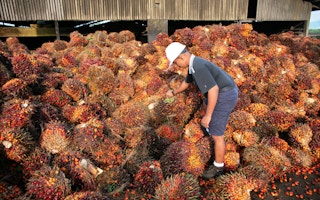International agribusiness firm Cargill launched a programme on Monday to help oil palm smallholders in Malaysia produce sustainable palm oil and drive up standards within the industry.
To continue reading, subscribe to Eco‑Business.
There's something for everyone. We offer a range of subscription plans.
- Access our stories and receive our Insights Weekly newsletter with the free EB Member plan.
- Unlock unlimited access to our content and archive with EB Circle.
- Publish your content with EB Premium.
The programme, developed in partnership with Malaysian social enterprise Wild Asia and international NGO Solidaridad, will assist smallholder farmers, dealers, refiners and mills to meet sustainable palm oil production requirements and gain certification. This will be achieved through training, capacity building and technical support, said the firm.
It comes just as Singapore, Malaysia and Indonesia are experiencing the worst air pollution in history due to illegal land clearing across Sumatra as farmers burn the land to prepare for the next planting season. The latest haze outbreak has strained diplomatic ties between the neighbouring countries, and Singapore and Malaysian governments have asked for companies behind the hotspots to be named and taken to task.
Cargill, with headquarters in Minneapolis in the United States, is a member of the Roundtable on Sustainable Palm Oil (RSPO), a global group advocating the growth and use of sustainable oil palm products.
The American firm, whose oil palm plantations number mostly in Indonesia and Malaysia, has committed to supply customers in top markets like Europe and the US with RSPO-certified palm oil products by 2015, or those sourced from smallholders.
This new programme is a step towards this commitment, which has not always been straightforward. Cargill has previously faced accusations about human rights violations in their palm oil supply chain, as well as carrying out practices against RSPO criteria, which international NGO Rainforest Action Network detailed in an investigative report.
In this latest initiative, Cargill plans to support over 2,500 independent smallholders, mainly from the state of Perak, in the course of three years.
Currently, there are about 177,000 oil palm smallholders in Malaysia operating on 14 per cent of the country’s total oil palm planted area.
Cargill Palm Products managing director Chai Wei Joo said in a statement: “This multi-party, independent oil palm smallholder programme is a significant milestone for progressing smallholder development towards the adoption of sustainable practices. Smallholders who are constrained by resources need the right training and support to learn how to increase their productivity and become sustainable.”
The company, together with Wild Asia, will use the Wild Asia Group Scheme (WAGS), an approach the latter started in 2010 to organise smallholders and give them representation and eventual certification in the global palm oil supply chain.
Through this, smallholders will be able to conduct best agriculture and farm practices, increase oil palm yields and have higher incomes.










